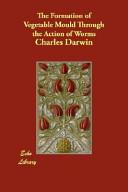Quotes from book
The Formation of Vegetable Mould through the Action of Worms

The Formation of Vegetable Mould Through the Action of Worms, with Observations on their Habits is an 1881 book by Charles Darwin on earthworms. It was his last scientific book, and was published shortly before his death . Exploring earthworm behaviour and ecology, it continued the theme common throughout his work that gradual changes over long periods of time can lead to large and sometimes surprising consequences. It was the first significant work on soil bioturbation, although that term was not used by Darwin .
